Says Ambassador Caiza Rosero of Colombia in Seoul
By Joy Cho, Special Feature Editor of The Korea Post media
Ambassador Juan Carlos Caiza Rosero of the Republic of Colombia in Seoul said, “The Embassy of Colombia in Seoul launches an online photo exhibition entitled, The Korean War through the Eyes of a Colombian Veteran, to commemorate the 70th anniversary of the Korean War Outbreak on June 25, 1950.
Speaking at a breakfast with Korean media representatives at the Four Seasons Hotel in Seoul on June 23, Ambassador Caiza Rosero said, “This year commemorates the 70th anniversary of the Korean War, an event that marked the establishment of special bilateral friendship and brotherhood relations between Colombia and Korea.”
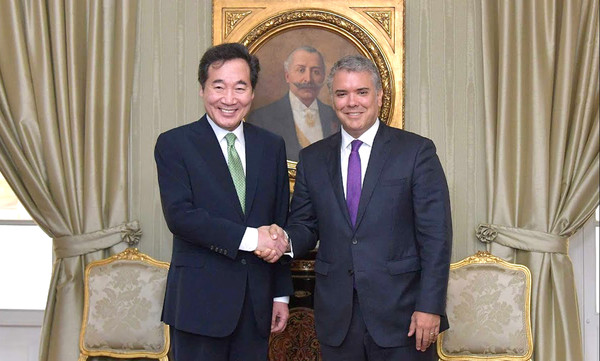
Excerpts from the statement of Ambassador Carlos Caiza Rosero of following:
The Embassy of Colombia in Seoul launches an online photo exhibition entitled, The Korean War through the Eyes of a Colombian Veteran, to commemorate the 70th anniversary of the Korean War Outbreak on June 25, 1950.
“This year commemorates the 70th anniversary of the Korean War, an event that marked the establishment of special bilateral friendship and brotherhood relations between Colombia and Korea.”
To commemorate this important day, the Embassy of Colombian in Seoul, with the support of the War Memorial of Korea, will hold an event on June 26th at the Museum. The act will begin with a floral offering at the Peace Plaza, in which a tribute will be paid to the veterans of the different countries that participated in the War.
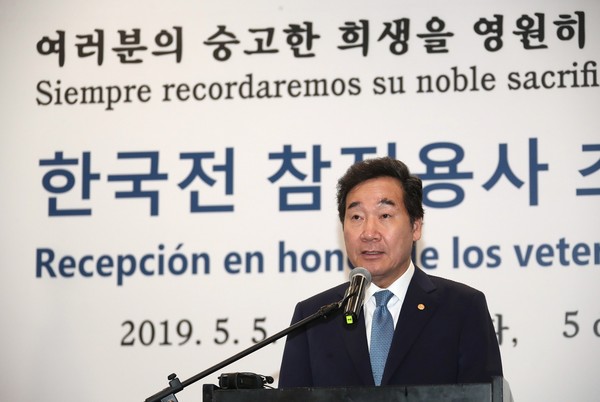
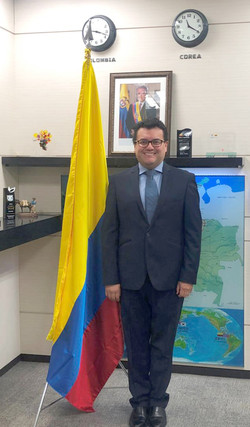
Subsequently, a conference will be held with the participation of the Ministers of National Defense of Colombia and Korea, as well as the Korean minister of Patriot and Veterans Affairs. The event will begin with opening remarks by Ambassador Juan Carlos Caiza and then the Ministers will extend a message of recognition to the 420 Colombian veterans, who will participate via online in the meeting with their families.
To close the event, there will be a launch of an online exhibition of color photographs taken during the Korean War by Sergeant Major Gilberto Diaz Velasco, a Colombian veteran who will present via online his experience during the confrontation. The exhibition will remain open to the public for a period of 6 months on the website of the War Memorial of Korea.
The participants of the event will be the Ambassadors of the countries that sent troops to the Korean War and from countries that provided medical support during the conflict, the Ambassadors of the Latin American countries in Seoul, and representatives of the Governments of Colombia and Korea.
On May 5 last year, Prime Minister Lee Nak-yon visited Colombia and vowed continued efforts to honor the sacrifices by Colombian soldiers who fought in the 1950-53 Korean War, including finding the remains of some 60 that have yet to return to their homeland.
Lee made the remarks at a luncheon with 40 war veterans and their surviving families in the Colombian capital that day.
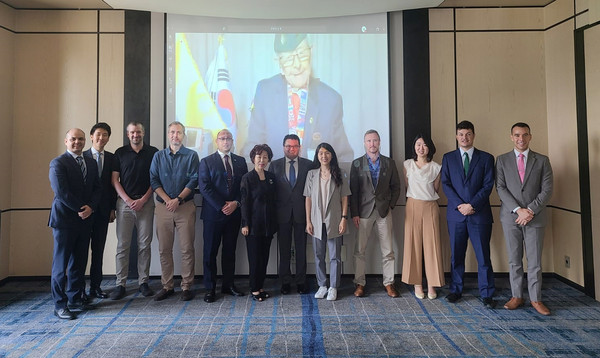
"On our land rests the remains of over 60 war veterans that have yet to return to their home country. We are doing our best to find them at the truce line and bring them to the bosom of their families at the earliest date possible," Lee said.
"With your sacrifices and dedication, the Republic of Korea was able to protect freedom and peace, and achieve (the economic) growth that we have accomplished today," he said. "Because of you, Korea and Colombia have become brothers who shared blood and are cooperating and developing together. We cannot thank you enough."
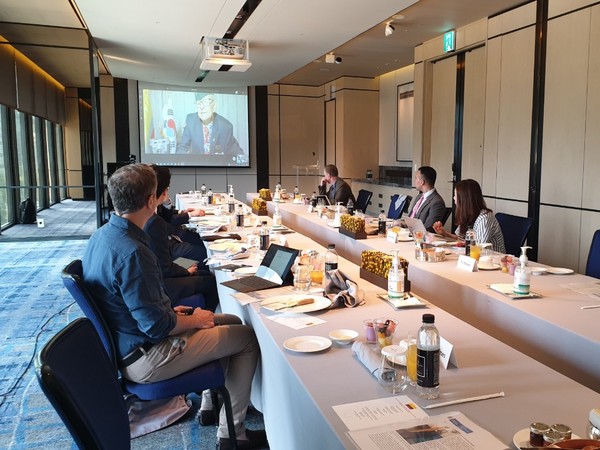
Colombia was the only South American nation that sent its troops to fight in the Korean War. Of its 5,314 soldiers, 213 died or went missing and 567 were injured.
Lee stressed South Korea's unwavering pursuit for lasting peace on the Korean Peninsula and assured it will continue to make every effort to make it happen.
"We yearn for the Korean Peninsula, which was once a flashpoint in Northeast Asia, to be able to send a message of peace to the world," he said. "That will also be a way to reciprocate your commitment."
Bogota City Paper published an interesting story on April 2, 2018, on the contribution made by the Colombian troops during the Korean War to the defense of freedom and democracy in Korea.
According to report by Juliana Saldana of the Bogota City Paper, Colombia entered the Korean War when newly-elected President Laureano Gómez saw greater U.S. economic support for direct involvement as an ally and a means to “erase any bad lingering impressions caused among U.S. policymakers of his previous attitude of anti-U.S. sentiment during World War II,” as historian David Bushnell recounts in his work The Making of Modern Colombia. On June 15, 1951, the first 1,000 soldiers of the Colombia Battalion under the command of Lt. Colonel Jaime Polanía Puyo disembarked in the Bay of Pusan. For the first time in the Republic’s history, the Colombian national anthem was played in Asia, with the hope that Colombia would show its courage to the world.
Carlos Latorre Franco turned 19 in the middle of the Korean peninsula, fighting a war far from his native Colombia. As 1952 dragged on, two years of relentless combat between North Korea and South Korea left thousands of soldiers from various countries dead and the country in ruins. Carlos, like many of his fighting companions from Colombia, only wanted to hold his country’s reputation high and return home alive.
The 1st Colombia Battalion was a volunteer force of young fighting men, ready to die for their love of country and to secure the freedom of South Korea. Attached to the 24th U.S. Infantry Division, Colombian sailors also did their part, deployed off Korean waters in the country’s only frigate, the Almirante Padilla. Between 1951 and 1954 some 5,100 Colombian soldiers served in Korea.
Of the 5,100 Colombians sent to Korea, most were between 18 and 21 years of age. 131 Colombians died in combat, 10 in service-related accidents, and two of natural causes. 476 men were injured, 69 disappeared in combat, and 30 were taken POWs.
Although many of the soldiers remain anonymous and their valiant acts in Southeast Asia undocumented, the survivors of the 1st Colombia Battalion returned home to face another tragedy: indifference by many Colombians and the rejection of their ideals. Colombia closed the door on them, quickly erased their patriotic efforts, and shunned those who bore the wounds of war. The Colombians who served in Korea were admired by their foreign fighting companions but forgotten by their compatriots. The veterans of Korea found themselves fighting for respect and opportunities for work in their homeland. Decades after the last Colombian soldier returned home from Korea, their only recognition was taking part in the Independence Day march on July 20 and a monument was erected in their honor on the Calle 100 with Carrera 7 in Bogotá.
Unfortunately, the Korean War still is not over for many of these veterans. After years of fighting the Colombian government to live up to its responsibilities, the administration of President Andres Pastrana finally approved a law in which Korean War veterans have a right to a pension, housing subsidies and two month’s minimum wage, but only if they can prove they are living as “indigents.” This was a bittersweet victory for these forgotten fighting men. Through their association, ASCOVE, founded in 1958, the veterans continue to demand their rights and respect.
Jaime Díaz Gómez was 19 when he left Girardot and signed up for the 1st Colombia Battalion. Despite being injured during the war, he wrote a heartfelt letter to his mother asking her not to let him be removed from duty as a result of his wounds. He was not looking for praise or glory, having barely survived an attack by North Korean soldiers; he just wanted to keep going, as he knew his companions still had to face the snipers and barrage of gunfire. He was not looking to be labeled a hero; instead, he wanted to be sure he proudly stood for Colombia and for the honor of his fighting mates. Ten years ago, Jaime died without ever receiving a pension nor any recognition for his bravery.
Hugo Monroy belonged to the intelligence division of the Colombia Battalion and was only 16 when he was recruited for the war. As a teenager, he was too young to understand war, but he bravely put his life on the line. Today, Hugo is 74 and remembers sadly his companions who lost their lives in Korea. With a government subsidy and the help of his children, Hugo lives a quiet life in the capital yet begrudges the injustice associated with the word “indigent” in order to make ends meet.
Carlos Latorre Franco was in charge of the navy infantrymen of the Batallón Colombia. To this day he cannot erase the images of war from his mind nor can he ever escape the shrapnel embedded in his flesh from the wounds he received during a night of intense combat. Carlos is grateful for his own economic situation and the pension he receives thanks to years of working independently. He continues to fight for his companions who have not shared the same fortune.
More than 60 years after the beginning of Colombia’s direct involvement in the Korean War, the country has not been able to respond adequately to its veterans’ needs, and worse, many of these men are ignored. Of the 4,884 soldiers who returned there are currently only 1,000 men alive, and every year the number falls given that their average age is now 77 years old. As the last survivors of the Korea campaign march on fighting for their rights, they remain steadfast in their belief that they can still achieve the recognition they deserve, not just for themselves, but for their place in Colombia’s history.
Resume of Ambassador Caiza Rosero:
Name: Juan Carlos Caiza Rosero
Ambassador of the Republic of Colombia in the Republic of Korea, married to ANA PAULA MARTINEZ GARRIGOS (Mexican diplomat), is a lawyer from the Javeriana University of Bogotá, with a Master's Degree in Public Administration from the University of Columbia, New York (SIPA - School of International and Public Affairs) and Masters in Diplomacy and Laws from the Fletcher School at the University of TUFTS, Boston.
He has served as Consul of Colombia in the city of New York and as an advisor in the Direction of the National Department of Planning (DNP) in Colombia, in the preparation of the National Development Plan 2014 - 2018.
In two governments he has been an advisor to the Presidency of the Republic of Colombia for territorial public management in the coordination of the execution of projects with the 32 Governors and the 1102 Mayors of the Country.
He has been the National Manager of the Institute for the Planning of Energy Solutions (IPSE), an entity that aims to bring to the territorial projects with non-conventional energy sources.
He was Vice Minister of Transportation and consultant to different organizations such as Vulcan Inc. (Washington), the (ICCF) International Conservation Caucus Foundation (Washington), the (GGGI) Global Green Growth Institute, (USAID) United States Agency for International Development (through Olgoonik Technical Services LLC and MSI Management System International), the (UNDP) United Nations Development Program (in the execution of Energy Efficiency pilots in the Industrial Sector), the (DNP - FONADE) Financial Fund for Development Projects (in the execution of the Nariño Plan Contract $ 1.5 billion Colombian pesos), (OEI) Organization of Ibero-American States (in the Execution of the Project Lights for Learning), (CAF) Development Bank for Latin America and the (UNDP) United Nations Development Program (for Electronic Government matters), among others.

